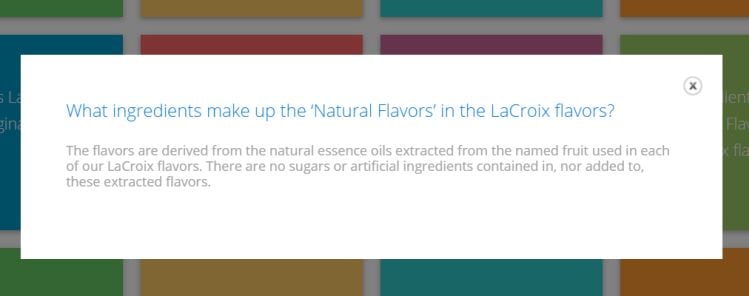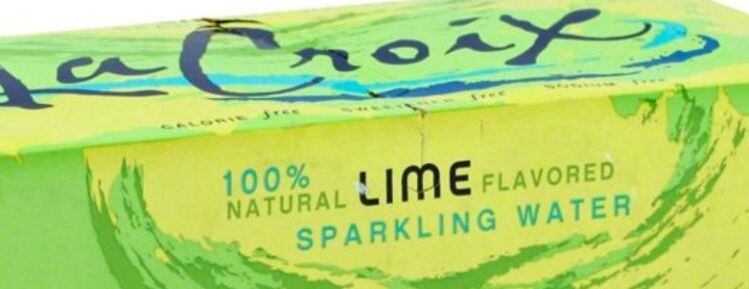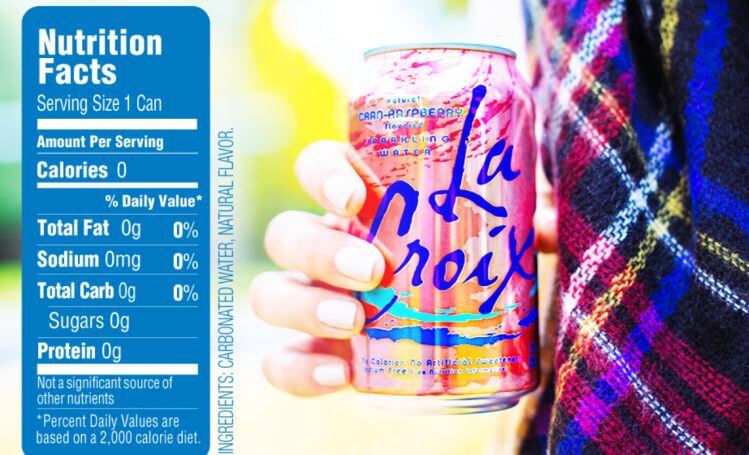In a complaint* filed in New York on January 29, 2019 (three months after a similar complaint was filed in Illinois) plaintiffs Adenike Graham and Kimberly McNulty allege that LaCroix sparkling waters (which have two ingredients: carbonated water and natural flavor) contain synthetic ingredients.
Unlike the Illinois lawsuit** (which didn’t offer any detail about testing methods, or state whether the drinks were tested at all), the New York complaint alleges that The Center for Applied Isotope Studies (CAIS) at the University of Georgia used compound specific stable isotope analysis (CSIA) and gas chromatography isotope ratio mass spectrometry (GC/IRMS) tests to “determine whether the LaCroix Products contain synthetic ingredients.”
It added: “It was determined by CAIS that the LaCroix Products contain synthetic ingredients ranging from 36% to 98%.”
It does not state whether it believes the synthetic ingredients in question are flavoring substances such as those identified in the previous lawsuit (eg. limonene etc) or incidental additives such as propylene glycol sometimes used as solvents/flavor carriers in natural flavors, but said:
“Naturally derived caffeine from green tea extract rather than synthetic is a popular trend in consumer products looking for the more health-driven consumer. Although these two substances are chemically identical, sophisticated testing has been developed to distinguish between the two.
“The Center for Applied Isotope Studies (CAIS) at the University of Georgia is at the forefront of the scientific community in applying analytic measurements to determine whether food ingredients are synthetic or natural.”
National Beverage Corp: Independent tests showed ‘no trace of artificial or synthetic additives’
In a statement issued January 31, National Beverage Corp slammed those behind the lawsuit as “professional liars” on a mission to “falsely attack our brand integrity.”
A 'prominent law firm' had had LaCroix essences independently tested by an accredited lab at LaCroix’s request following the October 2018 lawsuit, said National Beverage Corp: “No trace of artificial or synthetic additives were found, further confirming supplier certifications.”
“We unequivocally stand behind these results and refute contrary claims contained in lawsuits, including the one filed this week in New York,” added CEO Nick Caporella.
Attorneys for the plaintiffs have not responded to a request for comment on NBC's claims that they are 'professional liars.'
'This is a reliable, validated and established method'
Asked about the testing method, Randy Culp, PhD, associate director, Center for Applied Isotope Studies, University of Georgia, told FoodNavigator-USA that he could not comment on the lawsuit.
But he added:"While I cannot answer specifics about a case or clients' proprietary information, I can tell you we have been doing this type of testing for over thirty years and analyzed thousands of different products and chemical compounds for their authenticity.
"CSIA and GC/IRMS are methods to authenticate the source of chemicals through their isotopic signature after separation, ie Compound Specific Isotopic Analysis. When this method is performed and compounds of interest are isolated and identified, any depletion of the radiocarbon concentration, from the norm expected or derived from modern plants of recent harvest, is an unambiguous indication of synthetic or "fossil-fuel" derived compounds.
"This is a reliable, validated and established method and we have the ISO17025:2005 accreditation to confirm that. My only interest in an independent laboratory's contradicting assertion, is how did it make its determination?"

According to flavor industry sources contacted by FoodNavigator-USA, four flavoring substances identified in the 2018 complaint (ethyl butanoate, limonene, linalool and linalool propionate) are naturally occurring, but could also be produced synthetically.
They also noted that some synthetic ingredients (solvents, flavor carriers etc) such as propylene glycol are permitted in natural flavors and don’t have to be declared unless they are serving some kind of functional purpose in the final product. However, National Beverage Corp insisted that “All essences contained in LaCroix are certified by our suppliers to be 100% natural…
“Natural flavors in LaCroix are derived from the natural essence oils from the named fruit used in each of the flavors. There are no sugars or artificial ingredients contained in, nor added to, those extracted flavors.”
Attorney: Can the plaintiff prove that La Croix used synthetic versions of flavor ingredients that can be derived from natural sources?
Speaking to FoodNavigator-USA last year when the first lawsuit was tiled, William Dance, an attorney at law firm Tucker Ellis, said the issue was whether the overall beverage would be considered all natural by a reasonable consumer, not about what’s permitted in natural flavors.
While there is a legal definition of 'natural flavors,' *** there is no legal definition of ‘natural’ or ‘all natural’ as a general claim on a food label, beyond FDA guidance issued in 1993 noting that, “[FDA] has not objected to the use of the term [natural] on food labels provided it is used in a manner that is truthful and not misleading and the product does not contain added color, artificial flavors or synthetic substances.”
Although the FDA has maintained radio silence on the ‘natural’ issue since its November 2015 call for comments on natural claims, FDA commissioner Dr Scott Gottlieb said in a speech in March 2018 that there was a lack of clarity around the term 'natural,' adding: "We’ll have more to say on the issue soon."
'Natural flavors are on the radar for scrutiny'
Speaking to FoodNavigator-USA last fall, Wendel, Rosen, Black & Dean partner William Acevedo told us: “I think that it is fair to say that natural flavors are on the radar for scrutiny. It’s a foreseeable offshoot of the ‘All Natural’ complaints, and I think that plaintiff’s attorneys are drilling down ever deeper into labels and ingredient lists to find infractions.
“While suppliers often guard their natural flavors formulations as proprietary information, the prudent manufacturer should insist on a written representation that a natural flavor does not contain any synthetic sub-ingredient from the supplier before it makes any ‘natural’ claim [editor's note: LaCroix says all its essences are 'certified by our suppliers to be 100% natural'].
"Even so, a manufacturer is ultimately responsible for ensuring that its labeling is not false or misleading in any particular, which requires a clear understanding of what it can defensibly put on its product labels," said Acevedo. "That’s the lesson to be learned from these lawsuits.”
* The case is Adenike Graham and Kimberly McNulty et al v. National Beverage Corporation 1:19-cv-00873 filed in the southern district of New York on January 29, 2019. The plaintiffs allege violations of New York’s Unfair and Deceptive Trade Practices Act, breach of contract/common law warranty, and unjust enrichment. They are represented by Simmons Hanly Conroy LLC, Greg Coleman Law PC, Barbat, Mansour & Suciu PLLC, and Bruca Law, PLLC.
** The case is Lenora Rice et al v National Beverage Corp d/b/a LaCroix Sparkling Waters. Case # 2018-ch-12302 filed in Cook County Illinois on October 1, 2018.
***There is a legal definition of natural flavors (21CFR101.22 (3)), which the FDA says means “the essential oil, oleoresin, essence or extractive, protein hydrolysate, distillate, or any product of roasting, heating or enzymolysis, which contains the flavoring constituents derived from a spice, fruit or fruit juice, vegetable or vegetable juice, edible yeast, herb, bark, bud, root, leaf or similar plant material, meat, seafood, poultry, eggs, dairy products, or fermentation products thereof, whose significant function in food is flavoring rather than nutritional.”


